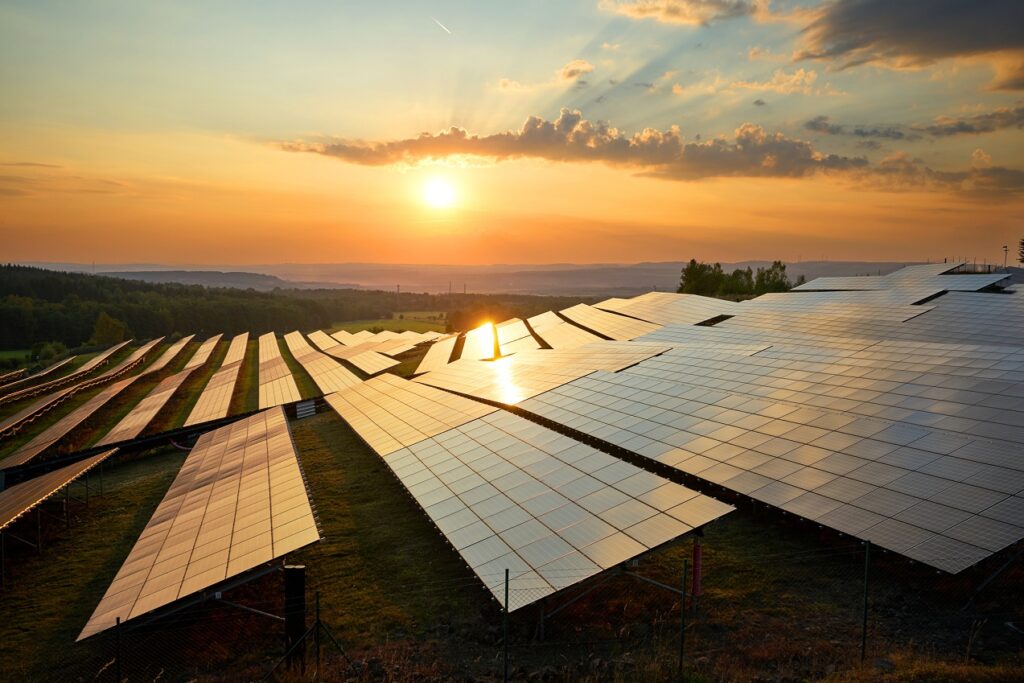The UK can achieve net zero by the middle of the century for just £14 billion more a year by leaning on domestic renewable energy.
According to a new report from Good Energy, put together with support from the Energy Systems Catapult (ESC), by 2050 renewables could provide 98% of all electricity, even with demand set to double. This is a significant jump from 27% of all electricity in 2020, and an urgent increase in investment will be needed.
A total of 210GW of solar power and 150GW of wind capacity will be required, as well as 100GW of lithium-ion battery energy storage. A substantial amount of this growth is possibly by 2030, with 100GW of solar and 70GW of wind power needed to hit 84% of the electricity mix by the end of the decade.
The report Renewable Nation: Pathways to a Zero Carbon Britain provides an “an inspiring vision of a zero carbon Britain which is greener, fairer and eminently achievable” said Juliet Davenport OBE, founder of Good Energy. But “meaningful, urgent action to turn that vision into a reality” is needed from all sections of society.
“The UK has one of the toughest and boldest climate targets in the world. We must all play our part if we want to see the benefits of this shift to a truly sustainable society.”
The report argues that the UK can decarbonise without the need for new nuclear beyond Hinkley Point C, the only new nuclear plant currently under construction. Instead, the UK should embrace a diverse range of renewables by ringfencing capacity for new technologies such as wave, tidal and geothermal in government-backed schemes going forwards. These could provide 34GW of power by 2050.
Additionally, ‘people power’ will be needed, with half of all houses adopting rooftop solar panels, while over 80% of heating and 90% of transport is electrified. This includes smart electric vehicle charging helping to balance the grid, with the need for flexibility from storage and demand side response key for the green grid of the future.
The government should incentivise the installation of residential solar panels, the report said, providing interest free financing for green home measures. It should focus on deploying known solutions now, and also work to accelerate utility scale solar and wind through annual Contracts for Difference auctions. This echoes calls from a number of industry groups recently, including Solar Energy UK, which called for an increase in the frequency of the auctions to help treble solar capacity.
Beyond this, the Green Homes Grant should be replaced to increase the installation of heat pumps, a stable carbon price should be set and 1.5% of GDP should go to net zero R&D. The heat and transport industries should focus on electrification as opposed to hydrogen, as the cheapest and most efficient method of decarbonisation it continued, with green hydrogen favoured over blue where it is needed.
The modelling in the report – the first to use the ESC’s Storage and Flexibility model, which combines long-term investment planning with hour-by-hour grid balancing – suggests that the annual cost of the total energy system will be approximately £126 billion. This will include all energy for heating, transportation, electricity and industry. The UK currently spends around £117 billion per year on these.
Philip New, CEO of ESC said the scenarios developed through its modelling were created “to test current thinking around the technologies we need; to imagine different versions of the future; and to promote debate around the choices we need to take”.
“Some of these pathways offer unique constraints on the energy system – a deliberate approach to test how it could cope under conditions which are rarely modelled.
“The results offer fresh insight into how we can cut emissions quickly, cheaply and with technologies which are readily available,” he continued.
“The work underlines both the incredible commercial opportunities for the innovative UK energy companies we work with every day and the need for market reform to unlock the low carbon future we want.’
Good Energy has calculated that the net cost of decarbonising energy is between £14-49 billion. This is fully manageable it said, in particular when compared with other branches of spending, such as the UK’s current £42 billion defense budget.
Finally, the renewable energy provider has called for the creation of a net zero watchdog to protect consumers, drive decarbonisation and tackle ‘greenwashing’ – this has been a key focus for Good Energy historically, with criticism leveled against the use of Renewable Energy Guarantee of Origin certificates in particular.
UK decision making should not just be constrained by the 2050 target though, with policy makers legislating for a decarbonisation mandate for Ofgem to protect consumers beyond that.
A Future Generations Bill with net zero and the Sustainable Development Goals at its heart should be key to future policy making, including a mandatory net zero clause for all private and public investment.





